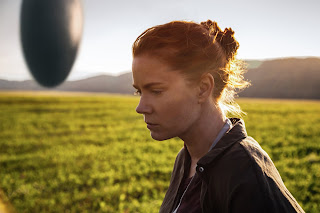Apparently there is, or at least there’s life on some planets in this immense universe and, sooner or later, people living there will come to see us.
This has been one of the biggest fears in human history and one of the most exploited subjects in science-fiction movies since the creation of cinema more than 100 years ago.
There is a bunch of titles that obviously come to mind thinking about this, from the (almost) reassuring version of Steven Spielberg in Close encounters of the third kind and ET, to the frightening one of the Alien series, to the irreverent and crazy exploit of Tim Burton in Mars Attacks!.
From now on, we must add a further view, the one signed by Québécois film-maker Denis Villeneuve: his movie Arrival is, by far, one of the powerful and poignant aliens landing of cinema history.
Louise Banks, a linguistic teaching in a college, remembers very well the day aliens arrived on planet earth. Suddenly, overnight, twelve immense spacecrafts almost land (they are not exactly touching ground but remain suspended over it) in twelve different parts of the world. One of them is Kansas, and this is where Colonel Weber of the US Forces asks Louise and mathematician Ian Donnelly to go to, in order to understand the aliens language and to decode their messages, hoping they’re coming “in peace”. Time is an urgent matter, because in other places (China, especially), politicians are about to declare war to the aliens, and panic is spreading everywhere in the world.
 |
| Louise Banks (Amy Adams) and Ian Donnelly (Jeremy Renner) |
In these last years, some of my favourite movies have been made by film-makers coming from the Montreal area, and I’m talking, ça va sans dire, about Xavier Dolan and Denis Villeneuve.
Even if extremely different, they both have a very personal and passionate approach to what they film, and the wonderful habit of creating movies that can’t possibly leave the audience indifferent.
They’re talented and they want to make movies in their own way. And I like it!
Villeneuve’s breakthrough was the amazing Incendies, back in 2010, followed by Prisoners and Enemy, both made in 2013, both with stunning performances by Jake Gyllenhaal, so-called thrillers but much more than that. Thrillers with a deep soul, if you know what I mean. In 2015, Villeneuve was in competition at the Cannes Film Festival with Sicario, a breath taking movie about the cartel war on the Mexican border, having as main character a strong yet amazingly vulnerable woman, superbly played by Emily Blunt.
Arrival is certainly this: it is science-fiction, but just on the surface, because what Villeneuve wants to tell us has nothing to do with it. And there is a scene in the movie that summon up his whole career: Louise going nearer the glass that separates her from the two enormous, pretty scary aliens, bringing in her hands a panel where she has simply written: HUMAN.
We are human and this is what the film-maker is interested in: why we do what we do, in the way we are doing it? What is the mystery behind our decisions, behind our feelings? And will a new, possible awareness of our future lives, change the way we act?
Arrival also talks about the world we live in: the fragility of our social systems, of the relationships between countries, and the lack of understanding that could so easily lead to ghastly catastrophes.
We need to better understand each other if we want to avoid the worst, maybe it is as simple as that.
And Villeneuve seems to strongly believe in it: the only element that could save this messy world from his destruction is the humanity in us.
And it is not by chance that, in another key scene, the scientist confesses to Louise: "The most amazing thing that happened here wasn’t meeting them. Was meeting you."
Maybe science-fiction will save romance, after all.







0 commenti:
Posta un commento